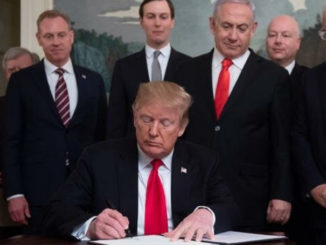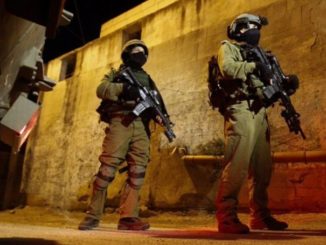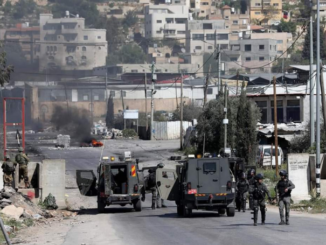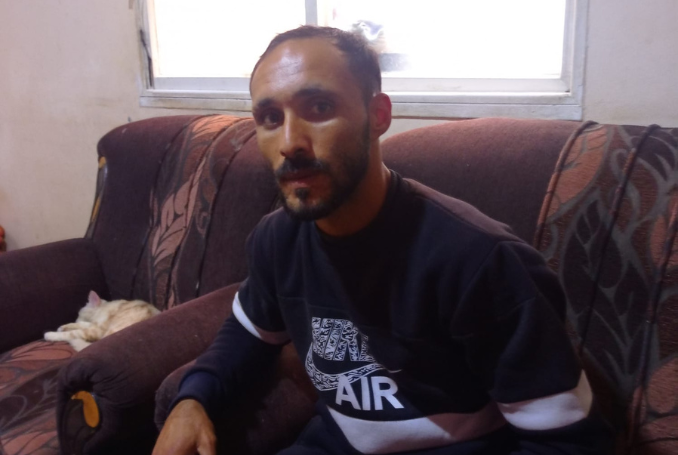
Mahmoud Alsaidi, 29, barely escaped death. Now the Gazan fisherman cannot smell and he struggles to eat.
In January 2016, Mahmoud and his brother Mohamed were three and a half miles out at sea in a rented fishing boat. The arbitrary six-mile fishing zone off of Gaza’s coast was strictly patrolled by the Israeli military.
“We were pulling the net to go home. Without warning, the Israeli Navy opened fire and shouted at us to stop,” Mahmoud described. “They wanted to shoot the engine and arrest us. I hugged the engine. This engine is more precious than our son and if it is gone, I can’t replace it with another one. We can hardly find engines in Gaza and if they exist, they are so expensive.”
Mahmoud did not stop the boat as they had not violated the designated Israeli fishing zone. Mahmoud knew that if he stopped, the forces would seize their boat and they would never see it again.
Since 2007, Israel has banned fishing equipment from entering Gaza. Basic necessities including fishing nets, GPS devices, boat engines, and the simplest fishing tools, are restricted. The prohibitions have devastated the Palestinian fishing economy and have destroyed the lives of fishermen who support their families through fishing. Israel does not compensate Gazan fishermen for the loss of their equipment and tools.
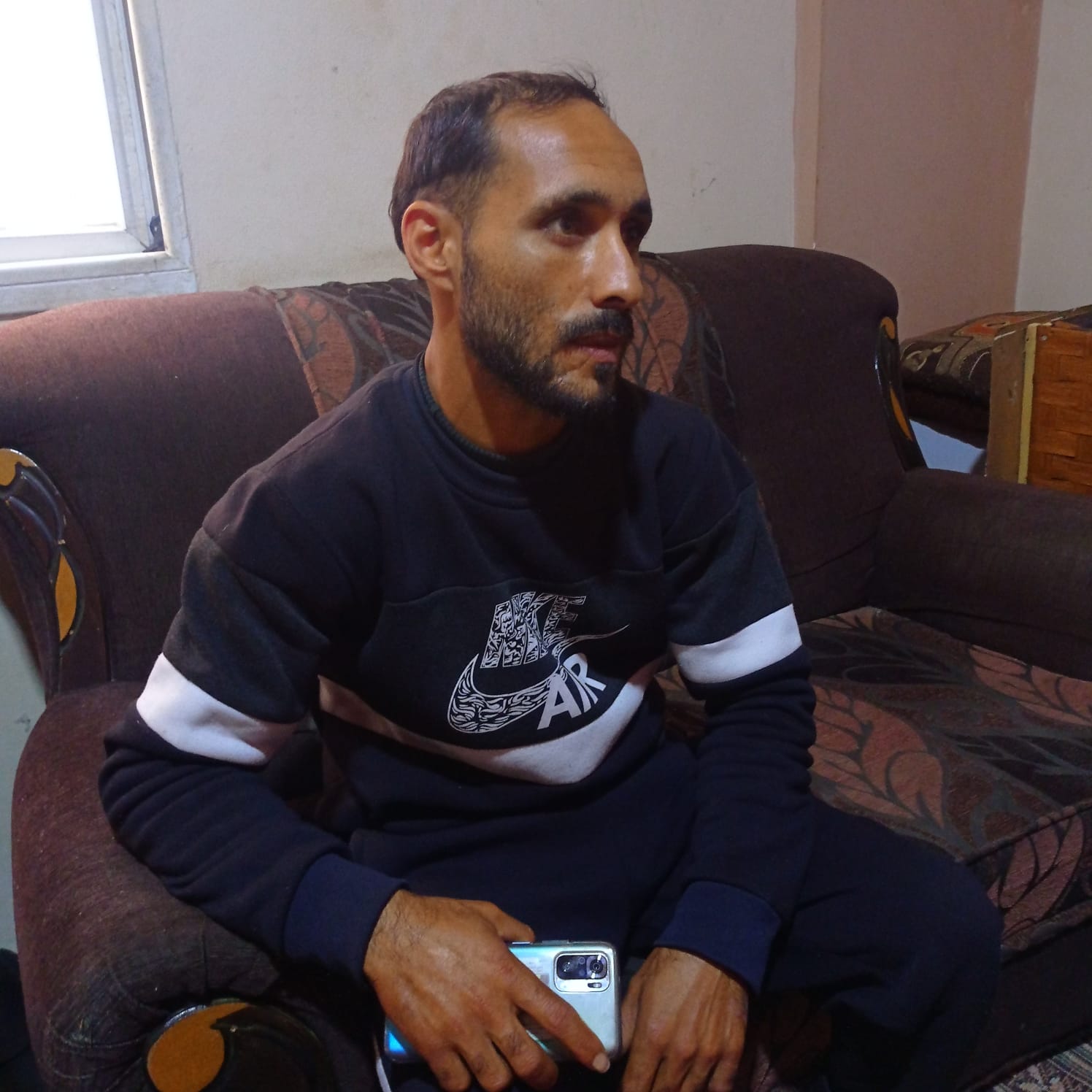
During the chase, the Israeli gunboat aggressively collided with half of Mahmoud’s small boat. Both Mahmoud and Mohamed were terrified and shocked. “All this area got stuck in the front of the Israeli ship as I hugged the engine,” Mahmoud described pointing at his chin and throat. “I bled heavily and my brother pulled me to his chest and stopped the boat. The Israeli forces seized me and took me to a nearby hospital.”
The injured fisherman spent 18 days in the ICU.
Mahmoud lost his larynx and his vocal cords were cut. “They put a plastic tube instead of my throat so I can speak and eat,” he said, straining to speak.
“The first thing he uttered was ‘I want to go home.’ I went crazy and wailed. This is not your voice, my son. This is not my son. I want my son back,” his mother, Fikria, 57, recalled while sobbing and tapping sorrowfully at her bosom.
Mahmoud’s cousin, Khader Alsaidi, also a fisherman, was shot in both eyes by the Israeli Navy while at sea. Khader’s new son, little Khader, was born after his father lost his eyes.
“When little Khader says ‘Baba’, Khader says ‘I want to see you, my son. Do you look like your mother or me?’ How would you feel when you hear a father saying this?” Fikria asked in agony. Khader does not leave his home anymore.
Mahmoud can only eat a small piece of bread and drink two glasses of water a day. “I wish to eat without struggling to swallow again. I wish to eat two pieces of bread instead of one or drink three glasses of water. But if I do so, the food will come out from my nose.” Mahmoud’s life is shattered forever.
Helpless
Abdelrahman Abu Ryala, 17, was supposed to return home with $6 USD but ended up losing $12,000 USD. His earnings from fishing support his mother and little siblings after his own father was murdered by Israeli forces while fishing in 2015.
On November 1, 2022, Abdelrahman was 10 miles out at sea at 2:00 AM in his boat. The enforced fishing zone was 12 miles. Abdelrahman was with five other boats. Suddenly, Israeli gunboats opened fire on Abdelrahman and the others.
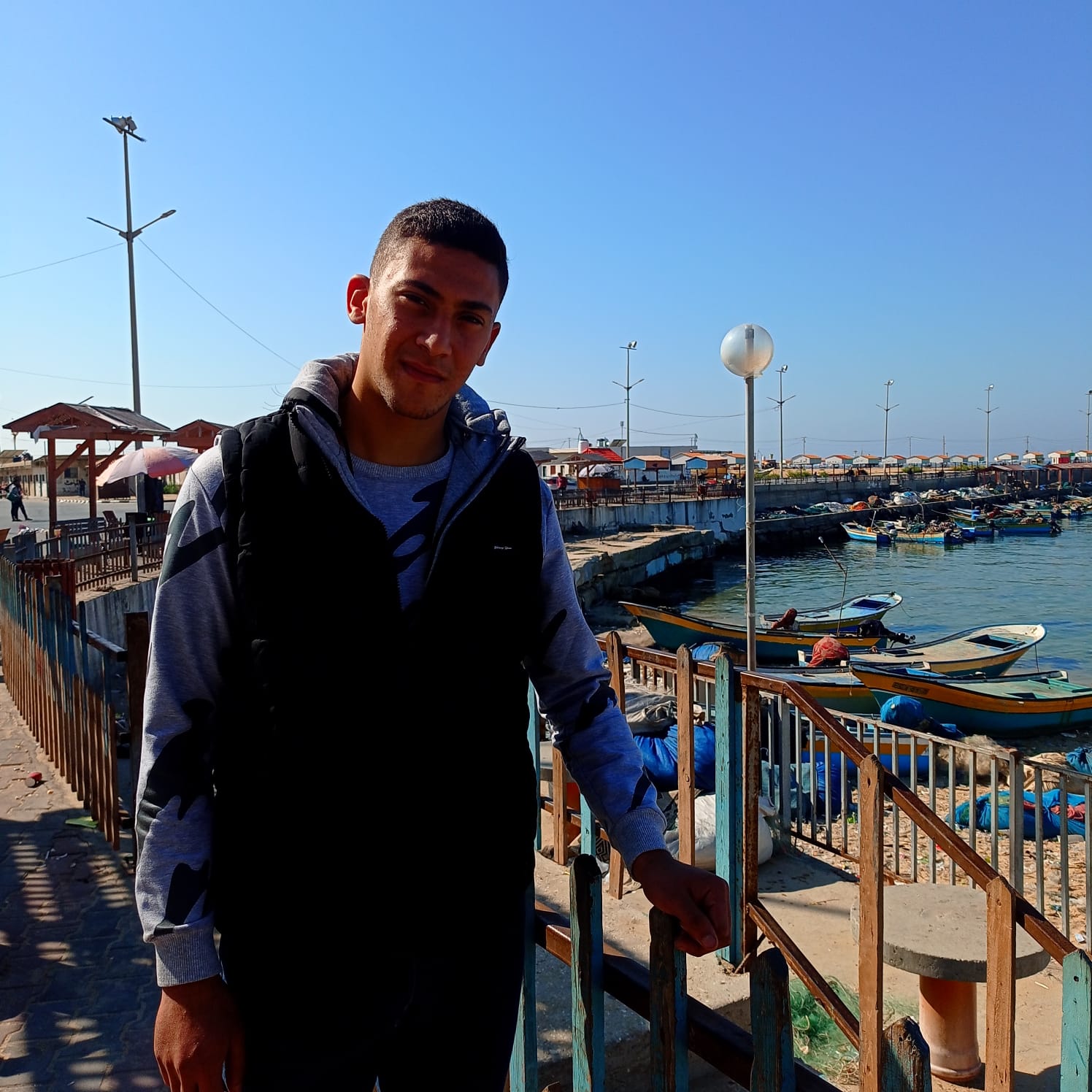
Four boats managed to escape. Abdelrahman and another boat could not escape in time. Israeli forces arrested the boys, confiscated their fishing boats, and seized their GPS devices without explanation. Without GPS devices, they cannot locate their ships or the location of their fishing nets.
The loss of Abdelrahman’s fishing boat was especially traumatizing as it once belonged to his own father before the Israelis murdered him. “I saw them take my precious boat in front of my eyes and I could do nothing. It is mine. I have the last word on it, but I was helpless,” he expressed with misty eyes. “After my father was killed, I borrowed money to buy an engine and a net.” The Israeli forces never returned his boat or compensated him for the illegal confiscation.
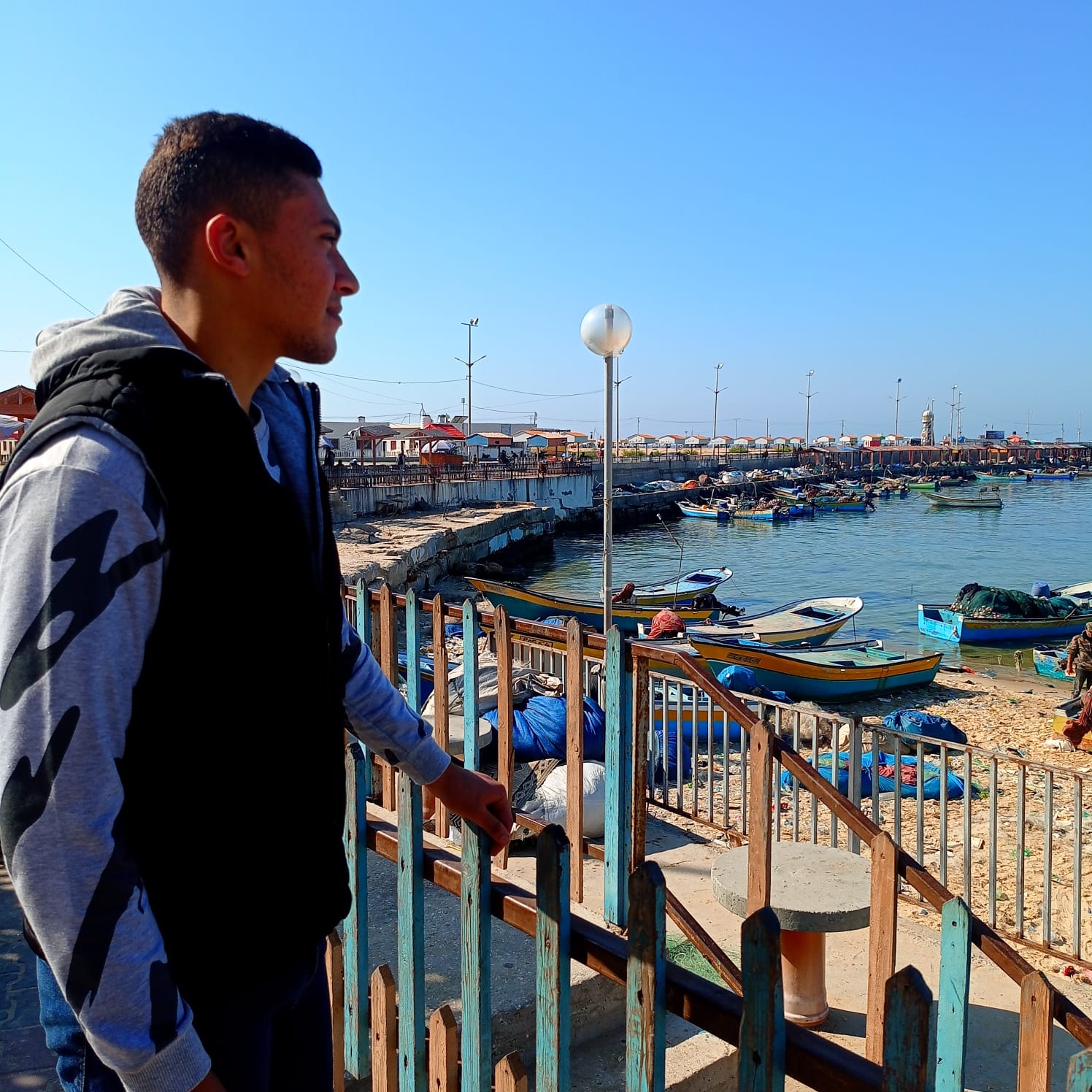
Abdelrahman and three other fishermen were arrested and imprisoned in Ashdod port. Their hands and legs were forcefully shackled from arrest until release.
“Mohamed Tulbah was slapped in the face for telling the soldiers, ‘I need to sit straight due to pain from the platinum in my leg’,” Abdelrahman said.
They were released ten hours later. However, Abdelrahman lost his boat and his only source of income.
“Fishermen want to live in peace. When I go to the sea, I only think about one thing: my livelihood. We don’t think about Israelis; we just want to eat,” explained Abdelrahman.
Fishing in a Prison
During the same incident, fisherman Zayed Taroush, 31, was assaulted by Israeli officers and arrested. His boat and fishing equipment were confiscated.
Zayed has two children and is expecting a third. He lost his source of livelihood as a result of his arrest. “When I watch videos about fishermen in other countries, my heart cries. Why can’t we fish peacefully and freely like them?” Zayed observed.
Zayed’s father, also a fisherman, promises, “I will not leave my son. He, his wife, and his children eat from our same dish.”
Zayed adds, “My 7-year-old son, Jamal, told me not to go fishing again but I can’t leave the sea. That is all I know.”
He was also imprisoned for six months in 2017 without charge.
“We are imprisoned in the vast sea. The zone is too small and crowded with many fishermen in Gaza,” the father complained. “The fisherman is like a sparrow. If the sparrow is in a cage, it cannot bring its livelihood.”
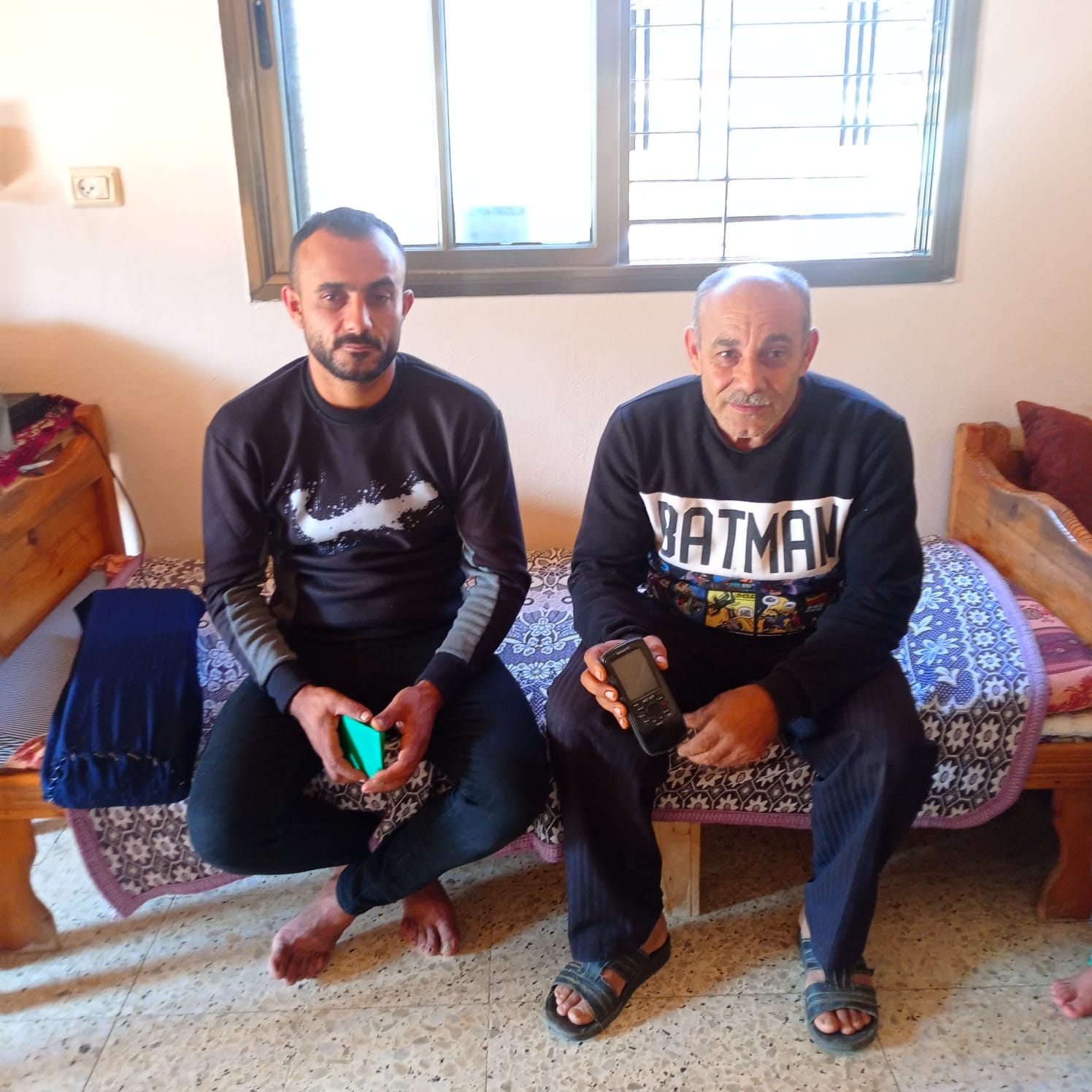
Zakarya Bakr, head of the Fishermen Union in Gaza, told PC, “The average monthly income for fishermen is $146 USD to $175 USD meaning the daily average is $6 USD. This represents one-fourth of the average monthly income for fishermen in 2006 which was $439 USD.”
“During 2022, Israeli forces shot at fishermen 380 times. Fifty-nine fishermen were arrested with four still imprisoned. Twenty-five fishermen were injured. Twenty-two boats were taken and destroyed either completely or partially,” Bakr reported.
Mohammed Abuhashem, a legal researcher at the Palestinian Centre for Human Rights, told PC, “Enforcing a fishing blockade and targeting fishermen with open gunfire and arrest is a clear violation of the International Covenant on Economic, Social and Cultural Rights (ICESCR) and the Geneva agreements.”
Abuhashem continued, “Arbitrary restrictions on a fishing zone are collective punishment amounting to a war crime. Moreover, even when Israeli authorities enforce such a discriminatory fishing zone, they must use proportionate power. Israel’s violation of these rules is a war crime as the fishermen are unarmed civilians and there is no evidence that they posed a threat to an Israeli soldier’s life.”

Lubna Abuhashem is a freelance writer and translator from Gaza. We Are Not Numbers contributed this article to The Palestine Chronicle.

